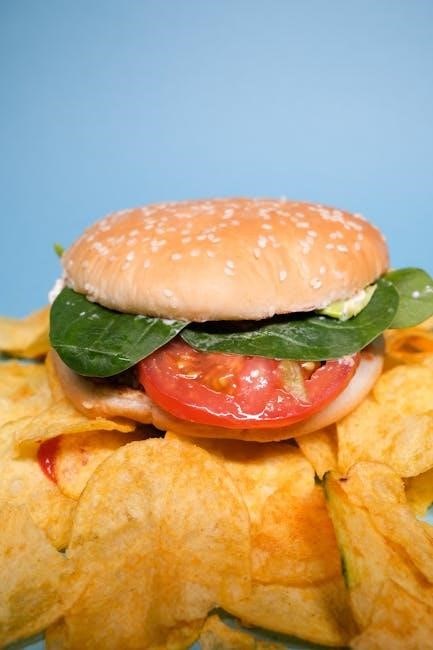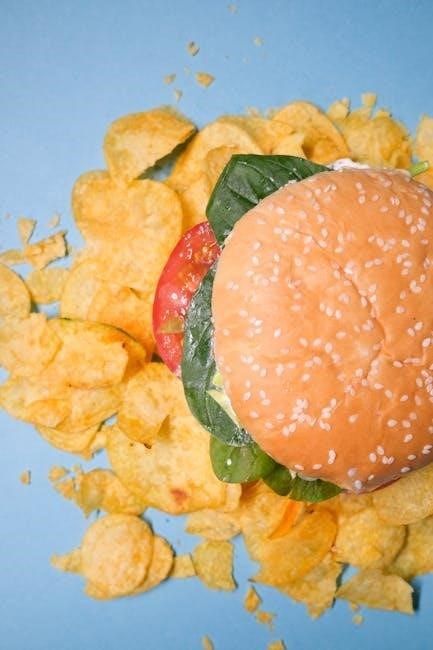4000 calorie meal plan pdf

A 4000-calorie meal plan is designed for individuals requiring high energy intake, such as athletes or those aiming to gain weight. It focuses on balanced macronutrients, calorie-dense foods, and strategic meal timing to meet dietary needs effectively. This plan is customizable to suit different lifestyles and preferences, ensuring sustainable weight gain and muscle growth. By incorporating nutrient-rich foods and supplements, it supports overall health while maintaining a high caloric intake.
Why 4000 Calories?
A 4000-calorie meal plan is designed to meet the high energy demands of individuals who require significant caloric intake to support growth, performance, or weight gain. This plan exceeds the average daily recommendation, making it ideal for athletes, bodybuilders, or those with fast metabolisms. The additional calories provide the necessary fuel for muscle recovery, strength training, and overall physiological function. For instance, athletes engaging in intense sports or endurance activities often burn thousands of calories daily, making it challenging to meet their energy needs with a standard diet. Similarly, individuals aiming to bulk up or gain muscle mass require a caloric surplus to support muscle synthesis and growth. A 4000-calorie diet ensures they consume enough nutrients to achieve their goals without compromising on nutrition or taste.
Who Needs a 4000 Calorie Diet?
A 4000-calorie diet is typically required by individuals with high energy needs, such as professional athletes, bodybuilders, and those engaged in strenuous physical activities. Football players, rugby athletes, and endurance runners often require this level of caloric intake to fuel their performance and recovery. Additionally, individuals with fast metabolisms or those who are underweight may benefit from a 4000-calorie meal plan to gain weight healthily. Growing teenagers with active lifestyles and people recovering from illnesses or surgeries may also need increased caloric intake to support healing and growth. Furthermore, certain medical conditions or genetic factors that increase energy expenditure can make a high-calorie diet necessary. This plan is tailored to ensure individuals meet their nutritional and energy needs while maintaining overall health and well-being.

Key Principles of a High-Calorie Meal Plan
A high-calorie meal plan revolves around strategic eating to maximize energy intake while maintaining nutritional balance. The plan emphasizes consuming calorie-dense foods such as nuts, avocados, and whole grains, which provide more calories per serving. It also advocates for frequent meals throughout the day, including snacks, to meet the high caloric goal. Protein-rich foods are prioritized to support muscle growth and repair, while healthy fats are included to boost calorie content without sacrificing nutrition. Additionally, the plan encourages staying hydrated, as water supports digestion and overall bodily functions. Portion control is adjusted to ensure meals are sufficiently large to meet the 4000-calorie target. Finally, the plan promotes consistency and tracking to monitor progress and make adjustments as needed. By following these principles, individuals can achieve their caloric goals effectively and sustainably.

Structuring the 4000 Calorie Meal Plan
A well-structured 4000-calorie meal plan balances macronutrients, ensuring adequate protein, carbohydrates, and fats. It includes 3 main meals and 2-3 snacks, spaced evenly throughout the day to maintain energy levels and support growth. Portion sizes are adjusted to meet caloric needs, with a focus on nutrient-dense, high-calorie foods. The plan is designed to be flexible, accommodating individual preferences and dietary requirements while ensuring consistent caloric intake.

Breakfast Options
Breakfast is a crucial meal in a 4000-calorie diet, setting the tone for the day. High-calorie, nutrient-dense options are essential. Consider starting with:
- Eggs Benedict with avocado and whole-grain English muffins (600-700 calories).
- Protein pancakes topped with peanut butter, maple syrup, and fresh fruit (800-900 calories).
These options provide a mix of protein, healthy fats, and complex carbohydrates, ensuring a balanced and filling start to the day. Adding a glass of whole milk or a Mass Gainer shake can further boost caloric intake if needed.

Lunch Ideas
Lunch is a key component of a 4000-calorie meal plan, requiring nutrient-dense, calorie-rich options to maintain energy levels throughout the day. Consider these high-calorie lunch ideas:
- Grilled chicken breast with quinoa, roasted vegetables, and a side of avocado (800-900 calories).
- Tuna salad sandwich on whole-grain bread with mixed greens and sweet potato fries (850-950 calories).
- Beef or turkey burger with a whole-grain bun, cheese, bacon, and a side salad (900-1000 calories).
These meals are designed to provide a balance of protein, healthy fats, and carbohydrates while meeting high caloric needs. Adding sides like whole grains, nuts, or seeds can further increase calorie intake. Ensure portion sizes are generous to reach the daily goal.
Dinner Recipes
Dinner is a crucial meal for those following a 4000-calorie meal plan, requiring hearty, nutrient-dense options to meet high energy demands. Consider these calorie-rich dinner ideas:
- Grilled steak with roasted vegetables and sweet potato mash (900-1000 calories).
- Oven-baked salmon with quinoa and steamed broccoli (850-950 calories).
- Chicken parmesan with pasta and marinara sauce (950-1050 calories).
- Beef stir-fry with brown rice and mixed vegetables (1000-1100 calories).
- Vegetarian chili with beans, corn, and avocado (900-1000 calories).
These recipes focus on balancing protein, healthy fats, and complex carbohydrates while providing ample calories. Adding sides like whole grains or roasted nuts can further boost caloric intake. Portion sizes should be generous to ensure the meal plan’s goals are met.
Snacks and Supplements
Snacks and supplements play a vital role in a 4000-calorie meal plan, helping to bridge the gap between meals and ensure caloric goals are met. High-calorie snacks are essential for those with high energy needs. Consider these options:
- Nut butters with whole-grain toast or bananas (300-400 calories per serving).
- Trail mix with nuts, dried fruits, and chocolate (350-450 calories per cup).
- Protein shakes or mass gainer supplements (250-500 calories per serving).
- Cheese, hard-boiled eggs, or Greek yogurt (150-300 calories per serving).
- Smoothies with full-fat milk, protein powder, and fruit (400-600 calories).
Supplements like creatine, whey protein, and mass gainers can enhance caloric intake and support muscle growth. Timing snacks between meals and before bed helps maintain a consistent energy supply, ensuring the body meets its nutritional demands effectively. Portion sizes should be generous to maximize calorie consumption without sacrificing nutrient quality.
Macronutrient Breakdown
A 4000-calorie meal plan typically allocates 40-50% of calories to carbohydrates, 25-35% to protein, and 20-30% to fats. This balance supports energy needs, muscle growth, and overall health.

Proteins: Sources and Requirements
Proteins are essential for muscle growth and repair, making them a critical component of a 4000-calorie meal plan. Aim for 1.6-2.2 grams of protein per kilogram of body weight daily, translating to approximately 170-200 grams for most individuals. High-quality sources include lean meats like chicken, turkey, and beef, as well as fish such as salmon and tilapia. Eggs, dairy products, and plant-based options like legumes, tofu, and quinoa are also excellent choices. Distribute protein intake evenly across meals, with 30-50 grams per meal and 20-30 grams in snacks. This ensures consistent muscle synthesis and satisfies hunger. For those with higher energy needs, protein shakes or supplements can help meet targets. Prioritize whole foods but use supplements as needed. Balancing protein with carbs and fats ensures overall dietary harmony and supports performance goals. Consulting a nutritionist can refine protein intake based on individual needs;
Carbohydrates: Types and Portion Sizes
Carbohydrates are the primary energy source in a 4000-calorie meal plan, fueling workouts and daily activities. Focus on complex carbs like whole grains, oats, brown rice, and quinoa, as well as starchy vegetables such as potatoes and sweet potatoes. Simple carbs, like fruits and white rice, are also beneficial for quick energy. Aim for 6-8 servings of carbohydrates daily, with portion sizes varying based on activity levels. For example, a serving of rice or pasta is about 1/2 cup cooked, while a serving of fruit is one medium piece. Distribute carbs evenly across meals to maintain energy levels. Pairing carbs with protein and fats enhances satiety and balances macronutrients. Incorporating calorie-dense carbs like dried fruits or granola can help meet the high calorie requirement. Prioritize whole, unprocessed sources for optimal nutrition and digestive health. Adjust portions based on individual energy needs and performance goals.
Fats: Healthy Sources for Calories
Fats are an essential component of a 4000-calorie meal plan, providing dense energy and supporting hormone production. Healthy fats include avocados, nuts, seeds, olive oil, and fatty fish like salmon. These sources offer monounsaturated and polyunsaturated fats, which are vital for heart health and reducing inflammation. Aim for 70-80 grams of fat daily, with a focus on unsaturated fats; Portion sizes vary: one avocado provides about 30 grams of fat, while a tablespoon of olive oil offers 14 grams. Incorporate fats into every meal to meet calorie needs and enhance meal satisfaction. Pairing fats with carbohydrates and proteins balances macronutrient intake. Avoid excessive saturated fats from processed foods, opting instead for whole, nutrient-rich sources. Proper fat intake ensures sustained energy and supports overall health, making it a cornerstone of a high-calorie diet.

Dietary Considerations
A 4000-calorie diet requires balanced nutrient intake, proper hydration, and whole foods to support energy needs and recovery.
Fiber Intake for Digestive Health
Maintaining adequate fiber intake is crucial for digestive health, especially on a high-calorie diet. Fiber helps prevent constipation, promotes satiety, and supports gut health. Aim for 25-30 grams daily from whole, unprocessed foods like whole grains, fruits, and vegetables. Include high-fiber foods such as oats, quinoa, broccoli, apples, and legumes. Pairing fiber-rich foods with calorie-dense options ensures you meet your energy needs without overloading on empty calories. For example, adding berries to oatmeal or incorporating spinach into smoothies boosts fiber content naturally. Drinking enough water is essential to prevent bloating and aid digestion. Balancing fiber intake with calorie goals ensures a healthy digestive system while maintaining energy levels for active lifestyles.
Vitamin and Mineral Requirements
A 4000-calorie meal plan must prioritize vitamin and mineral intake to ensure optimal health. These nutrients are essential for energy production, immune function, and overall bodily functions. Focus on vitamin-rich foods like leafy greens, citrus fruits, and fortified cereals. Vitamin D, calcium, and iron are particularly important, as they support bone health, muscle function, and blood cell production. Include mineral-dense options such as nuts, seeds, and whole grains. Magnesium and potassium help regulate metabolism and hydration, while B vitamins boost energy metabolism. Aim to meet 100% of the Daily Value (DV) for most vitamins and minerals. If dietary sources are insufficient, consider supplements after consulting a healthcare professional. Balancing macronutrients with micronutrients ensures a well-rounded diet that supports both caloric needs and long-term health.
Staying Hydrated on a High-Calorie Diet
Staying hydrated is crucial when following a 4000-calorie meal plan, as high caloric intake can increase metabolic rate and fluid loss. Aim to drink at least 3.7 liters of water daily for men and 2.7 liters for women, adjusting for activity level and climate. Include water-rich foods like fruits, vegetables, and broth-based soups to contribute to hydration. Additionally, herbal teas and low-sugar sports drinks can help replenish electrolytes during intense workouts. Avoid excessive caffeine and sugary beverages, which can dehydrate the body. Track your water intake throughout the day to ensure you meet your goals. Proper hydration supports digestion, nutrient absorption, and overall performance, making it a cornerstone of a successful high-calorie diet.

Cooking and Meal Prep Tips
Meal prepping is essential for consistency. Use calorie-dense ingredients to meet goals. Organize meals in advance to avoid overwhelm and ensure proper nutrition. Efficient cooking methods save time and preserve nutrients.

Calorie-Dense Foods to Include
Incorporating calorie-dense foods is crucial for meeting the 4000-calorie goal. Nuts, seeds, avocados, and whole grains are excellent choices due to their high caloric content. Dried fruits like dates and raisins provide quick energy. Full-fat dairy products, such as cheese and whole milk, add significant calories. Healthy oils, including olive, coconut, and avocado oil, are versatile and calorie-rich. Lean meats like chicken and turkey can be paired with sauces or gravies to enhance caloric intake. Egg yolks and granola or protein bars are also beneficial. Balancing these foods ensures a nutrient-dense diet while meeting caloric needs. Incorporate them strategically into meals and snacks to maintain variety and satisfaction.
Meal Prepping for Convenience
Meal prepping is essential for maintaining a consistent 4000-calorie diet. Start by planning your meals for the week, ensuring variety and nutritional balance. Shop for ingredients in bulk to save time and money. Prepare large batches of proteins, such as grilled chicken or fish, and pair them with complex carbohydrates like rice or pasta. Roasted vegetables can be prepped in advance and reheated as needed. Use airtight containers to store meals, keeping them fresh for several days. Portion out snacks like nuts, seeds, or protein bars for easy access. This approach saves time during the week and ensures calorie goals are met consistently. Meal prepping also reduces the likelihood of skipping meals or resorting to unhealthy options;
Cooking Methods to Maximize Calories
Cooking methods play a crucial role in achieving a 4000-calorie diet. Opt for techniques that enhance calorie density, such as sautéing in healthy oils or butter, which add calories without sacrificing flavor. Roasting and baking are excellent for retaining nutrients and calories, especially when using calorie-dense ingredients like avocado oil or olive oil. Incorporating cheese, cream, or nuts into dishes boosts calorie content naturally. For example, adding grated cheese to pasta or using full-fat dairy in recipes can significantly increase calories. Additionally, frying foods like eggs or proteins in oil can help meet daily goals. These methods ensure meals are both nutritious and calorie-rich, supporting muscle growth and energy needs without resorting to unhealthy processed foods.

Monitoring Progress
- Track weight changes and energy levels regularly.
- Adjust the meal plan based on progress and goals.
- Ensure consistent caloric intake to meet the 4000-calorie target.
- Maintain a balance of macronutrients for optimal results.
Tracking Caloric Intake
Tracking caloric intake is essential to ensure you meet the 4000-calorie target while maintaining a balanced diet. Use a food diary or mobile apps like MyFitnessPal to log meals and snacks, reducing guesswork and ensuring accuracy. Consistency is key, as even small deviations can impact progress. Pay attention to portion sizes and high-calorie foods to stay on track. Regularly review your logs to identify patterns and make necessary adjustments. Accurate tracking helps maintain accountability and supports long-term success. Combine this with weekly weight checks to monitor gains. Adjust portion sizes or food choices based on progress, ensuring you’re fueling your body effectively without overeating. Tracking also helps balance macronutrients, ensuring adequate protein, carbs, and fats for energy and muscle growth. This disciplined approach maximizes results and keeps you aligned with your goals.
Adjusting the Meal Plan as Needed
Adjusting the 4000-calorie meal plan is crucial to ensure it aligns with your changing needs and goals. Regularly monitor your progress, such as weight changes or energy levels, to determine if modifications are necessary. If weight gain is too slow, consider increasing calorie-dense foods or portion sizes. Conversely, if gaining too quickly, reduce intake of empty calories. Personal preferences and dietary restrictions may also require tweaks, such as swapping ingredients or meal ideas. Seasonal availability of foods can influence adjustments, ensuring fresh and nutritious options. Stay flexible and open to changes, as consistency and adaptability are key to success. Regular reviews of your meal plan help maintain its effectiveness and keep you motivated. Adjustments should be gradual and based on progress, ensuring the plan remains balanced and sustainable for long-term results.
Consulting a Nutritionist
Consulting a nutritionist is highly recommended when following a 4000-calorie meal plan, as they can provide personalized guidance tailored to your specific needs. A nutritionist will assess your goals, health status, and lifestyle to ensure the meal plan is optimized for maximum effectiveness. They can help balance macronutrients, address dietary restrictions, and recommend calorie-dense foods that align with your preferences. Additionally, a nutritionist can monitor your progress and make adjustments to prevent plateaus or health imbalances. Their expertise ensures that the high-calorie intake is distributed across nutrient-rich foods, supporting overall well-being. Regular consultations also help address any potential nutrient deficiencies and provide reassurance that the plan is safe and sustainable. A nutritionist’s input is invaluable for achieving your goals while maintaining long-term health;
A well-structured 4000-calorie meal plan supports weight gain and muscle growth. Balance macronutrients, stay hydrated, and consult a nutritionist for personalized advice. Consistency and mindful eating are key to success.
Final Thoughts on the 4000 Calorie Meal Plan
Adopting a 4000-calorie meal plan is a commitment to growth and energy. By focusing on nutrient-dense, calorie-rich foods, individuals can achieve their goals effectively. Balance is key, ensuring adequate protein, carbs, and fats. Staying hydrated and listening to your body are crucial for long-term success. Meal prepping and tracking intake help maintain consistency. Consulting a nutritionist can tailor the plan to individual needs, ensuring safety and effectiveness. Remember, patience and dedication are vital for sustainable results. With the right approach, a 4000-calorie diet can fuel muscle gain, improve performance, and enhance overall well-being. Always prioritize quality and variety to keep meals enjoyable and nutritious. Download a 4000 calorie meal plan PDF for a structured guide to simplify your journey.
Resources for Further Reading
For those seeking more detailed guidance, numerous resources are available to support a 4000-calorie meal plan. Reputable nutrition websites, fitness blogs, and scientific journals offer in-depth insights into high-calorie diets. Books on sports nutrition and meal planning can provide structured approaches. Additionally, online forums and communities share practical advice and recipes. For a comprehensive guide, downloading a 4000 calorie meal plan PDF from trusted sources like nutritionist websites or fitness platforms is highly recommended. These resources often include sample meal plans, grocery lists, and tips for maintaining consistency. Exploring these materials can enhance your understanding and help you tailor the plan to your specific needs; Always ensure the sources are credible to guarantee accurate and safe dietary advice.



Leave a Reply
You must be logged in to post a comment.